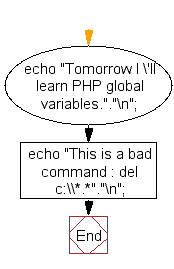PHP Exercises : Display strings
2. Display Strings with Escape Characters
Write a PHP script to display the following strings.
Sample Strings :
'Tomorrow I \'ll learn PHP global variables.''This is a bad command : del c:\\*.*'
String: A string is series of characters, where a character is the same as a byte. PHP supports a 256-character set, and hence does not offer native Unicode support.
Note: As of PHP 7.0.0, there are no particular restrictions regarding the length of a string on 64-bit builds. On 32-bit builds and in earlier versions, a string can be as large as up to 2GB (2147483647 bytes maximum).
A string literal can be specified in four different ways:
- single quoted: The simplest way to specify a string is to enclose it in single quotes (the character ').
- double quoted: The simplest way to specify a string is to enclose it in single quotes (the character ").
- heredoc syntax: A third way to delimit strings is the heredoc syntax: <<<. After this operator, an identifier is provided, then a newline.
- nowdoc syntax (since PHP 5.3.0): Nowdocs are to single-quoted strings what heredocs are to double-quoted strings. A nowdoc is specified similarly to a heredoc, but no parsing is done inside a nowdoc.
Sample Solution:
PHP Code:
<?php
// Display the string "Tomorrow I'll learn PHP global variables." and move to the next line
echo "Tomorrow I'll learn PHP global variables." . "\n";
// Display the string "This is a bad command : del c:\*.*" and move to the next line
echo "This is a bad command : del c:\\*.*" . "\n";
?>
Sample Output:
Tomorrow I 'll learn PHP global variables. This is a bad command : del c:\*.*
Explanation:
The above PHP code consists of two "echo" statements, each responsible for outputting a specific string to the screen:
- echo "Tomorrow I'll learn PHP global variables." . "\n";
- This line outputs the string "Tomorrow I'll learn PHP global variables." to the screen, and the ."\n" at the end adds a newline character, moving the cursor to the next line.
- echo "This is a bad command : del c:\\*.*" . "\n";
- This line outputs the string "This is a bad command : del c:*.*" to the screen. The use of double backslashes (\\) is necessary to escape the single backslash in the file path, preventing it from being interpreted as an escape character. The ."\n" at the end adds a newline character, moving the cursor to the next line.
Flowchart:

For more Practice: Solve these Related Problems:
- Write a PHP script to correctly display a string containing both single and double quotes without syntax errors.
- Write a PHP script to output multi-line strings with special escape sequences using only double quotes.
- Write a PHP script to concatenate two strings that include backslashes and quotes ensuring proper escape handling.
- Write a PHP script to display a JSON string that contains embedded quotes and backslashes.
Go to:
PREV : Write a PHP script to get the PHP version and configuration information.
NEXT : Inject Variable in HTML Template.
PHP Code Editor:
Contribute your code and comments through Disqus.
What is the difficulty level of this exercise?
Test your Programming skills with w3resource's quiz.
